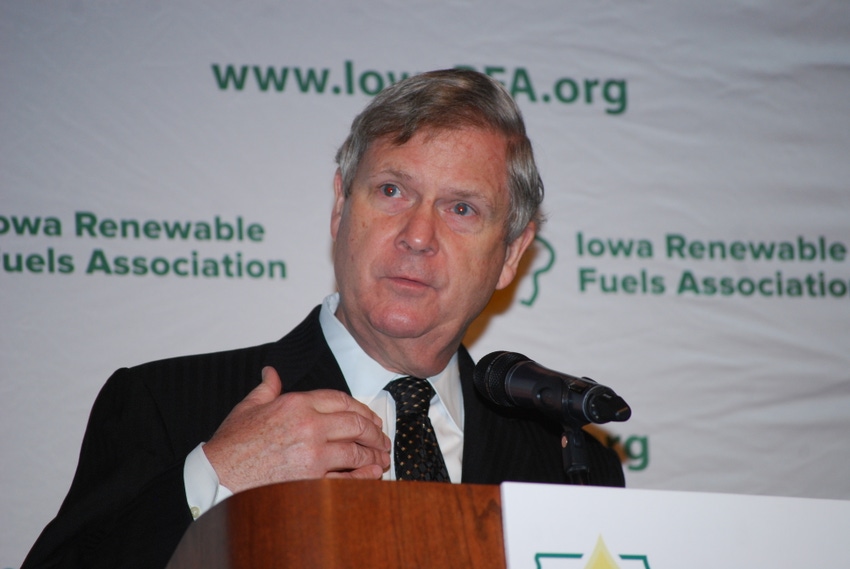
U.S. Secretary of Agriculture Tom Vilsack said he was disappointed the House failed to pass a farm bill before it expired on Sept. 30. And he isn't buying House Majority Leader Eric Cantor's excuse that there wasn't enough time and there weren't enough votes to pass the farm bill.
Vilsack told a group of about 125 dairy producers and agribusiness people that he isn't buying Cantor's excuse about why he couldn't pass a farm bill.
"The Senate passed the farm bill in June with bipartisan support, It was about the only thing the Senate has been able to get passed in the last two years," Vilsack said.
Vilsack said the House had both the time and the votes to pass a farm bill, but House leadership didn't want to deal with all the cuts the House's version of the farm bill calls for right before the election.
"The House managed to get the farm bill through their Ag Committee. Then, they couldn't get it through the House," he explained. "They (House leadership) said they didn't have enough time to pass the farm bill. But they were only scheduled to work eight days in September and they left town before they used up all eight days. They also failed to take a vote. We figure there would have been about 250 votes in the House – enough votes to have passed the farm bill. So they had the time and they had the votes. They just didn't want to pass the farm bill. Their version of the farm bill called for $184 billion in cuts over the next decade -- $50 billion for ag and $134 billion for food programs -- and that's a conversation they didn't want to have right now."
As a result, Vilsack says farmers and rural communities are paying the price.
"So we're stuck with no MILC Program and no Dairy Export Assistance Program, and there is no Beginning Farmer Programs no Conservation Programs that can take place," he said. "That's pretty significant stuff, but we can't do anything."
If the House doesn't pass a farm bill by the end of the year, then Vilsack said we will revert back to the 1949 Farm Bill.
"Under the 1949 Farm Bill, milk prices would climb to between $38 and $50 per hundredweight. That may sound good, but it will have a rippling effect and will impact consumer choices. Companies will reformulate their products without dairy or will use less dairy and consumers will buy less dairy. So, really, dairy farmers do not want that to happen."
Vilsack noted that there is a high level of stress and a high level of uncertainty in the country right now without a farm bill
"If you want to get a loan for next year, how do you convince the banker there is going to be a safety net? It's going to be very difficult."
Vilack said the farm bill aside, agriculture has an extraordinary story to tell.
"Since 1980, agriculture has been the second most productive industry in our country and dairy has had a lot to do with that," Vilsack says. "Average milk production has risen to 21,000 pounds of milk per cow. And we've seen a profound increase in the number of dairy products that get exported. You have created a brand of dairy products that people around the world want to enjoy. Dairy is doing $5 billion in exports annually."
The ag secretary says dairy has stepped up by reducing greenhouse gas emissions by 25% by 2020.
"We are working with dairy producers to capture methane and convert it into energy," he said. "Through the USDA, we have been financing one anaerobic digester every week in the U.S."
Dairy is also helping solve the obesity problem in the U.S.
"Today, only 19% of youngsters are physically fit to serve in the military," he said. "Dairy steps up by providing low fat nutrition to students in newly overhauled school lunch and school breakfast programs."
World Dairy Expo
"The secretary (Wisconsin Ag Secretary Ben Brancel) and I are going to take a tour of World Dairy Expo today," Vilsack said. "There is a lot to see and a lot to do. I think it's appropriate to celebrate what dairy does for our country."
What has happened in rural America in the last couple years is a great story, Vilsack told the audience.
"We've had:
*Record farm exports
*Record production of biofuel
*Record farm income
*Lower unemployment in rural areas due to agriculture.
"This is serious stuff for dairy producers, serious stuff for farmers and ranchers and serious stuff for rural America."
NOTE: This story was revised 10/3/2012 at 2:14 p.m. CDT to more accurately reflect Vilsack's comments.
About the Author(s)
You May Also Like




